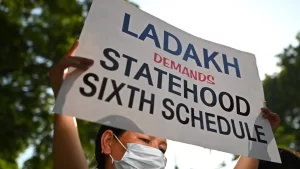Ladakh, Article 371, and the Sixth Schedule of the Constitution
Syllabus- General Studies-II
(GOVERNANCE, CONSTITUTION, POLITY, SOCIAL JUSTICE AND INTERNATIONAL RELATIONS)
CONTEXT-
- the recent offer by the union Home minister to extend Article 371-like protections to Ladakh a Union Territory witnessing protests demanding greater autonomy. It explores the demands for inclusion under the Sixth Schedule and compares it with the protections offered by Article 371.
Background:
Ladakh’s Aspirations for Autonomy
- Following the abrogation of Article 370 and the reorganisation of Jammu and Kashmir, Ladakh was carved out as a separate Union Territory without a legislature. This triggered demands from local groups like the Leh Apex Body (ABL) and the Kargil Democratic Alliance (KDA) for greater autonomy. They have been advocating for inclusion under the Sixth Schedule of the Constitution.

The Sixth Schedule and its Provisions for Tribal Areas
The Sixth Schedule provides a framework for the administration of tribal areas in certain northeastern states. It empowers the creation of Autonomous District Councils (ADCs) and Regional Councils (ARCs). These elected bodies have significant legislative, judicial, and administrative autonomy over tribal areas. This includes:
- Making laws on matters like forest management, agriculture, village administration, inheritance, marriage, and social customs.
- Establishing village councils or courts to settle disputes within tribal communities.
- Collecting land revenue, imposing taxes, regulating trade and money lending.
- Extracting royalties from mineral resources and establishing public amenities.
Ladakh’s Demand for Inclusion and the Government’s Response
- The inclusion under the Sixth Schedule holds significant appeal for Ladakh, with a majority of its population belonging to Scheduled Tribes. However, the government has rebuffed this demand while offering Article 371-like protections.

Article 371: Special Provisions for Specific States
- Articles 371 and its sub-clauses (A-J) provide special provisions for various states, addressing unique needs of specific religious or social groups. These provisions aim to safeguard their cultural, social, and economic interests.
- While Article 371 can offer some degree of autonomy, it falls short of the comprehensive framework provided by the Sixth Schedule. For instance, special provisions under Article 371 might ensure representation for Ladakh’s population through hill councils or job reservations, but it wouldn’t grant legislative powers over crucial local matters.
Precedence and Potential Implications
- This is a unique situation as special provisions under Article 371 have historically been extended to states, not Union Territories. If implemented, it would set a new precedent. The nature and extent of these protections for Ladakh remain to be seen.
Conclusion
- The offer of Article 371-like protections signifies the government’s acknowledgement of Ladakh’s concerns. However, it falls short of the demands for the wider autonomy envisaged under the Sixth Schedule. Whether these proposed protections will adequately address Ladakh’s aspirations for self-governance remains to be evaluated.

No Comments